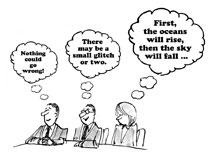 Imagine the sound of a ping pong ball falling on a hard surface. It bounces, bounces, bounces some more, and faster as it bounces away, and then bounces again, and then stops until someone picks it up and either bounces it again, or puts it in play. The phrase, “We need to…” is like that. You can insert whatever ending you like. It might be, “We need to get the roof repaired.” “We need to change that policy.” “We need to ensure we mesh our cultures.” Now imagine a CEO making such a statement to the executive team. “We need to make sure that before this merger, our two companies understand each other’s culture,” for example. What happens next? Bounce, bounce, bounce.
Imagine the sound of a ping pong ball falling on a hard surface. It bounces, bounces, bounces some more, and faster as it bounces away, and then bounces again, and then stops until someone picks it up and either bounces it again, or puts it in play. The phrase, “We need to…” is like that. You can insert whatever ending you like. It might be, “We need to get the roof repaired.” “We need to change that policy.” “We need to ensure we mesh our cultures.” Now imagine a CEO making such a statement to the executive team. “We need to make sure that before this merger, our two companies understand each other’s culture,” for example. What happens next? Bounce, bounce, bounce.
Well that’s the question, isn’t it? When anyone makes such a statement what is the expectation? Is the one asking the question going to do it? Is the listener supposed to do the action? You know you’ve made such a statemen; and I’m sure you’ve heard it from someone.
 It’s one thing for an individual in an organization to find themselves in a state of stress. But when events occur bringing on stress for most everyone in an organization, now you have a critical challenge on your hands. This stress spills out into families and the communities causing more critical and, in some cases, disastrous challenges. Seeing life from someone else’s perspective takes an open mind, active listening takes effort, and understanding takes commitment. These can take time. What are some additional elements that can help?
It’s one thing for an individual in an organization to find themselves in a state of stress. But when events occur bringing on stress for most everyone in an organization, now you have a critical challenge on your hands. This stress spills out into families and the communities causing more critical and, in some cases, disastrous challenges. Seeing life from someone else’s perspective takes an open mind, active listening takes effort, and understanding takes commitment. These can take time. What are some additional elements that can help?

We know how to communicate. We have a thought, we spot our listener, we open our mouth, and pour out the contents of that thought into our listener’s ear. We make an instant connection with one another. The listener hangs on our every word with respect and admiration, absorbs the intent of the thoughts we are conveying, behaves just as we are expecting, and acts upon that information exactly as we intend for them to. This process occurs every time, no matter what we’re speaking about or who we’re speaking with, right? No? You’re kidding! Well, it can’t be our fault!! What could be wrong with our communication process or style? Why didn’t the listener connect?
 Speaking, texting, writing, sign language, body language, hand gestures, infographics, graphics, email, snail mail, instant messaging, meetings (on and off-line), phone calls, speeches, social media, sky writing, telling stories, and advertising are some of the ways we communicate. Yet, we still have communication challenges. What’s up with that?
Speaking, texting, writing, sign language, body language, hand gestures, infographics, graphics, email, snail mail, instant messaging, meetings (on and off-line), phone calls, speeches, social media, sky writing, telling stories, and advertising are some of the ways we communicate. Yet, we still have communication challenges. What’s up with that?
 Anytime you have a plan in place for worse case scenarios, your people and your organization handle it better and the bounce back is quicker and higher. Some companies do have disaster plans in place. For example, there are plans for fire (domestic and wild), earthquakes, hurricanes, tornadoes, tsunami warnings, and oh yes, pandemics. Seriously, some organizations do keep such plans in place or at the least, watch the warning signs and get a head start. For example, Talking Rain Beverage Co., which took early warning signs seriously did get ahead of the curve in preparing their employees for the current crisis. What does this have to do with being a “Communication Hero?”
Anytime you have a plan in place for worse case scenarios, your people and your organization handle it better and the bounce back is quicker and higher. Some companies do have disaster plans in place. For example, there are plans for fire (domestic and wild), earthquakes, hurricanes, tornadoes, tsunami warnings, and oh yes, pandemics. Seriously, some organizations do keep such plans in place or at the least, watch the warning signs and get a head start. For example, Talking Rain Beverage Co., which took early warning signs seriously did get ahead of the curve in preparing their employees for the current crisis. What does this have to do with being a “Communication Hero?”
 Recently a colleague suggested that he doesn’t bother reading cover letters from job applicants as he feels they hold no value. To him, communication may be a dead art, but cover letters can provide great insight into a candidate’s qualifications, skills, and attributes. If a job seeker is smart, the cover letter is a valuable tool to landing that next job. In fact, according to Career Quest “communication skills consistently rank at the top of the list of soft skills hiring managers are looking for in new hires.” How can candidates and employees use communication for success?
Recently a colleague suggested that he doesn’t bother reading cover letters from job applicants as he feels they hold no value. To him, communication may be a dead art, but cover letters can provide great insight into a candidate’s qualifications, skills, and attributes. If a job seeker is smart, the cover letter is a valuable tool to landing that next job. In fact, according to Career Quest “communication skills consistently rank at the top of the list of soft skills hiring managers are looking for in new hires.” How can candidates and employees use communication for success?

Just when you thought you had this communication system thing all figured out, along comes more wires of misunderstanding to jumble up your fuse box. We’ve all, no doubt, been plugged into many of the basics of communication such as:
- Words, tone, and language
- The sender sends a message and the receiver must decode and interpret it
- We lose understanding via mechanical devices
- Levels of listening
- Barriers to communication
Just when you thought it was safe to have a conversation, two new studies tell us we still need to bring our communication efforts up a decibel or two. First is a study by Boyle, D.M., Mahoney, D.P., Carpenter, BW., and Grambo, R.J. This study conveys the shocking news that communication is not just for conversation any more. Now, it appears, that communication can aid in your career advancement – or not. The authors posit that communication skills encompass interpersonal skills and that these two skills are “[are] essential to a smooth career progression.” The study goes even further to suggest that both workers and the firm share an obligation to pursue training these areas.
The study gives fair warning to career newbies that texting and e-mail can be viewed as “inappropriate or inadequate” even at the staff level. When you realize that many complex business issues require face-to-face communication, switching from their insulated communication system may be a shock hazard for some young people.
 Coaching visiting business professionals who are in the United States working on projects for their countries is exciting, satisfying, and eye opening. This work is eye opening because seeing how these professionals work so diligently on learning American business customs and English is inspiring. Many will still want a session after a grueling drive from a business assignment in another state. They will sacrifice family time to keep their sessions. They will still want sessions even when they are not feeling well. They will often fret over wanting to use the exact correct word in a simple email. They are eager to understand the best ways to communicate ideas. They will struggle not to be insulting in their conversations. In short, they are diligent about communication. Don’t you wish you could say the same for your co-workers?
Coaching visiting business professionals who are in the United States working on projects for their countries is exciting, satisfying, and eye opening. This work is eye opening because seeing how these professionals work so diligently on learning American business customs and English is inspiring. Many will still want a session after a grueling drive from a business assignment in another state. They will sacrifice family time to keep their sessions. They will still want sessions even when they are not feeling well. They will often fret over wanting to use the exact correct word in a simple email. They are eager to understand the best ways to communicate ideas. They will struggle not to be insulting in their conversations. In short, they are diligent about communication. Don’t you wish you could say the same for your co-workers?
While communicating in English may seem like rocket science to foreign professionals at times, it shouldn’t be that way to us…and it isn’t. It takes a minimum amount of effort on our parts to recognize and appreciate the commutation styles of our peers, co-workers, families, and friends. The reasons for making this effort are many.
 “There are things known and there are things unknown,
“There are things known and there are things unknown,
and in between are the doors of perception.”
~~ Aldous Huxley, British Author 1894-1963
Understanding others can open doors to better communication, cooperation, and empathy. Empathy comes from one of the five dimensions of Emotional Intelligence and the external component of Emotional Quotient – Social Awareness. Having empathy makes us better people. But can we truly “walk a mile in another person’s shoes?” Can we truly understand another person’s behaviors, thoughts, feelings, motivators, and mental states?
 Recently, one of my executive coaching clients was pulling his hair out over people in one department who were always complaining about his team. His team complained about the other team – of course. His team is essentially sales and the other team is policies, procedures, and compliance. You might as well try to mix oil and water and try to make a soufflé. What is it that has these teams all in a twitter?
Recently, one of my executive coaching clients was pulling his hair out over people in one department who were always complaining about his team. His team complained about the other team – of course. His team is essentially sales and the other team is policies, procedures, and compliance. You might as well try to mix oil and water and try to make a soufflé. What is it that has these teams all in a twitter?
Sales people are typically, not always, but typically a little more loose with rules and procedures. They just want to go out and influence people to buy so they can get paid. And yes, typically they do make more money than the “policy and procedure (P & P) enforcers.” The green-eyed jealousy monster starts running amok through the P & P team. The P & P people feel they work harder, are under more stress, and are constantly correcting the mistake of the sales team. The sales team doesn’t like rules; they take too much time to comply with and they need to be out selling. They reason, that if it wasn’t for them the P & P team wouldn’t it HAVE a job!
 Imagine the sound of a ping pong ball falling on a hard surface. It bounces, bounces, bounces some more, and faster as it bounces away, and then bounces again, and then stops until someone picks it up and either bounces it again, or puts it in play. The phrase, “We need to…” is like that. You can insert whatever ending you like. It might be, “We need to get the roof repaired.” “We need to change that policy.” “We need to ensure we mesh our cultures.” Now imagine a CEO making such a statement to the executive team. “We need to make sure that before this merger, our two companies understand each other’s culture,” for example. What happens next? Bounce, bounce, bounce.
Imagine the sound of a ping pong ball falling on a hard surface. It bounces, bounces, bounces some more, and faster as it bounces away, and then bounces again, and then stops until someone picks it up and either bounces it again, or puts it in play. The phrase, “We need to…” is like that. You can insert whatever ending you like. It might be, “We need to get the roof repaired.” “We need to change that policy.” “We need to ensure we mesh our cultures.” Now imagine a CEO making such a statement to the executive team. “We need to make sure that before this merger, our two companies understand each other’s culture,” for example. What happens next? Bounce, bounce, bounce. It’s one thing for an individual in an organization to find themselves in a state of stress. But when events occur bringing on stress for most everyone in an organization, now you have a critical challenge on your hands. This stress spills out into families and the communities causing more critical and, in some cases, disastrous challenges. Seeing life from someone else’s perspective takes an open mind, active listening takes effort, and understanding takes commitment. These can take time. What are some additional elements that can help?
It’s one thing for an individual in an organization to find themselves in a state of stress. But when events occur bringing on stress for most everyone in an organization, now you have a critical challenge on your hands. This stress spills out into families and the communities causing more critical and, in some cases, disastrous challenges. Seeing life from someone else’s perspective takes an open mind, active listening takes effort, and understanding takes commitment. These can take time. What are some additional elements that can help?
 Speaking, texting, writing, sign language, body language, hand gestures, infographics, graphics, email, snail mail, instant messaging, meetings (on and off-line), phone calls, speeches, social media, sky writing, telling stories, and advertising are some of the ways we communicate. Yet, we still have communication challenges. What’s up with that?
Speaking, texting, writing, sign language, body language, hand gestures, infographics, graphics, email, snail mail, instant messaging, meetings (on and off-line), phone calls, speeches, social media, sky writing, telling stories, and advertising are some of the ways we communicate. Yet, we still have communication challenges. What’s up with that? Anytime you have a plan in place for worse case scenarios, your people and your organization handle it better and the bounce back is quicker and higher. Some companies do have disaster plans in place. For example, there are plans for fire (domestic and wild), earthquakes, hurricanes, tornadoes, tsunami warnings, and oh yes, pandemics. Seriously, some organizations do keep such plans in place or at the least, watch the warning signs and get a head start. For example,
Anytime you have a plan in place for worse case scenarios, your people and your organization handle it better and the bounce back is quicker and higher. Some companies do have disaster plans in place. For example, there are plans for fire (domestic and wild), earthquakes, hurricanes, tornadoes, tsunami warnings, and oh yes, pandemics. Seriously, some organizations do keep such plans in place or at the least, watch the warning signs and get a head start. For example,  Recently a colleague suggested that he doesn’t bother reading cover letters from job applicants as he feels they hold no value. To him, communication may be a dead art, but cover letters can provide great insight into a candidate’s qualifications, skills, and attributes. If a job seeker is smart, the cover letter is a valuable tool to landing that next job. In fact, according to
Recently a colleague suggested that he doesn’t bother reading cover letters from job applicants as he feels they hold no value. To him, communication may be a dead art, but cover letters can provide great insight into a candidate’s qualifications, skills, and attributes. If a job seeker is smart, the cover letter is a valuable tool to landing that next job. In fact, according to 
 Coaching visiting business professionals who are in the United States working on projects for their countries is exciting, satisfying, and eye opening. This work is eye opening because seeing how these professionals work so diligently on learning American business customs and English is inspiring. Many will still want a session after a grueling drive from a business assignment in another state. They will sacrifice family time to keep their sessions. They will still want sessions even when they are not feeling well. They will often fret over wanting to use the exact correct word in a simple email. They are eager to understand the best ways to communicate ideas. They will struggle not to be insulting in their conversations. In short, they are diligent about communication. Don’t you wish you could say the same for your co-workers?
Coaching visiting business professionals who are in the United States working on projects for their countries is exciting, satisfying, and eye opening. This work is eye opening because seeing how these professionals work so diligently on learning American business customs and English is inspiring. Many will still want a session after a grueling drive from a business assignment in another state. They will sacrifice family time to keep their sessions. They will still want sessions even when they are not feeling well. They will often fret over wanting to use the exact correct word in a simple email. They are eager to understand the best ways to communicate ideas. They will struggle not to be insulting in their conversations. In short, they are diligent about communication. Don’t you wish you could say the same for your co-workers? “There are things known and there are things unknown,
“There are things known and there are things unknown, Recently, one of my executive coaching clients was pulling his hair out over people in one department who were always complaining about his team. His team complained about the other team – of course. His team is essentially sales and the other team is policies, procedures, and compliance. You might as well try to mix oil and water and try to make a soufflé. What is it that has these teams all in a twitter?
Recently, one of my executive coaching clients was pulling his hair out over people in one department who were always complaining about his team. His team complained about the other team – of course. His team is essentially sales and the other team is policies, procedures, and compliance. You might as well try to mix oil and water and try to make a soufflé. What is it that has these teams all in a twitter?